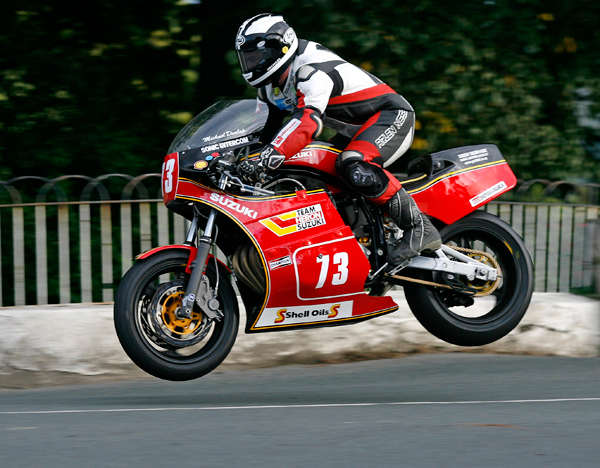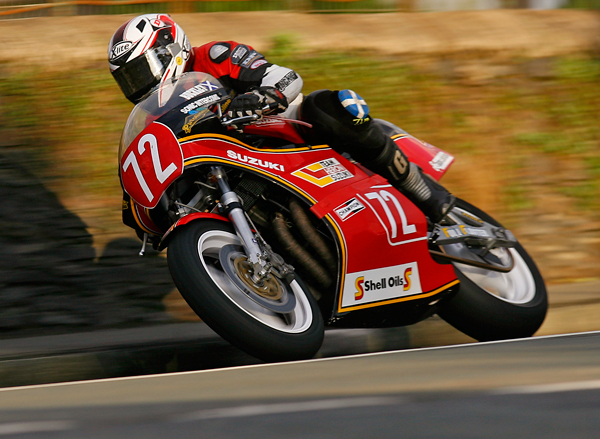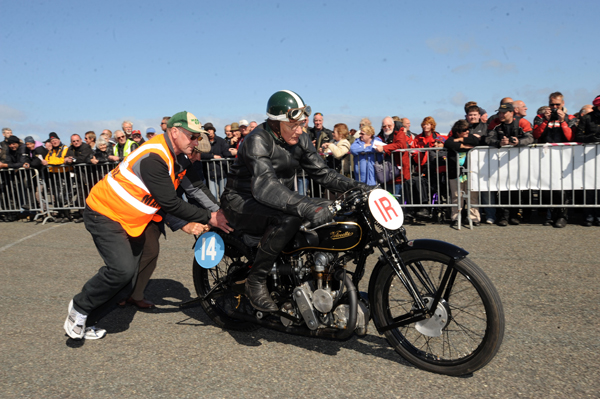ISLE OF MAN GOVERNMENT DEPARTMENT OF ECONOMIC DEVELOPMENT ANNOUNCES NEW PROPOSALS FOR MANX GRAND PRIX FESTIVAL



FOLLOWING a four-month research and consultation process that included focus groups and on-line surveys, The Isle of Man Government Department of Economic Development has launched proposals for a revised Manx Grand Prix Festival, which could come into effect from 2013. The 2012 Manx Grand Prix Festival will remain unchanged as published.
The new Festival proposals are designed to capitalise on the growing popularity of motorcycling nostalgia and would leverage the strength of the TT brand that is owned by the Isle of Man Government.
A shortened 10-day event, which would climax on the August Bank Holiday weekend, is designed to capitalise on the short-break motorsports market, minimise commitment and cost from the competitors, officials and marshals’ point of view and reduce disruption to individuals and businesses on the Isle of Man. It would also reduce event delivery costs that can be reinvested back into the Festival itself.
The 2013 Festival is proposed to run from the 17th of August to the 26th of August. The ‘centrepiece’ of the Festival would continue to focus on competitive racing around the world famous TT Mountain Course including three classic races and a further two races for modern machinery.
The Department hopes to create the most prestigious series of races for classic motorcycles in the world, featuring modern day TT stars along with existing classic racing specialists bringing the most exotic classic racing motorcycles in the world to the Isle of Man.
The event would also see a return for the Clubman’s TT titles which would be applied to two races for amateur riders on modern machinery. Designed as a more focused feeding ground for the current TT, the Clubman’s TT classes would incorporate a rider development structure with the opportunity for riders to receive sponsor funded TT scholarships and guaranteed entry into the TT.
The competitive racing programme would be supported by a festival of motorsport nostalgia including parade laps featuring legendary riders and machines from Mountain Course history, off road events including the Manx Classic Weekend Trial and exhibitions of exotic motorcycles and memorabilia. The event would also include the Isle of Man Vintage Motor Cycle Club activities including the popular ‘Festival of Jurby’ event that attracted over 15,000 visitors last year.
A revised Festival is expected to be more attractive to the motorsports media and be underpinned by a programme of commercial activity including international television coverage, sponsorship, brand licensing, digital activation and event ticketing. Further research will be undertaken to finalise a number of aspects in the detail of the revised festival, including the name and the Department recognises very clearly the need to work closely with its key partners in developing such a festival to ensure all detailed aspects of the proposals meet the needs of stakeholders.
Economic Development Minister, John Shimmin MHK, has welcomed the new proposals:
‘In the current economic climate, we have a responsibility to maximize returns from the significant investment required to run events of this nature. Local businesses have clearly indicated the opportunities that the Manx Grand Prix provides and I look forward to maintaining the existing levels of dialogue with the Manx Motor Cycle Club in order to resolve any concerns that might exist with regard to the new proposals.’
Colin Kniveton, Chief Executive, Department of Economic Development, commented:
‘Our market research and consultations have been extensive and we are grateful to everyone who has contributed to that process. The findings from this consultative process have provided us with some very clear outcomes that we are keen to act on.
‘The proposals are built very much on our consultations and market and media feedback and it is anticipated that a revised format to the Festival would give the Isle of Man real potential to increase visitor numbers, media profile and commercial incomes. Implementing these proposals would allow us to tap into the fast-growing nostalgia market that we have seen with events such as the Goodwood Revival and drive a tangible return on the ever increasing investment required to stage the event.’
ENDS
2013 Proposed Event Schedule
Saturday
Morning: – Classic Trial;
Afternoon: – Classic Trial; Evening:- Practice
Sunday
Morning: – Classic Trial;
Afternoon: – Classic Trial
Monday
Evening: – Practice
Tuesday
Evening: – Practice
Wednesday
Evening: – Practice
Thursday
Evening: – Practice
Friday
Afternoon: – Practice;
Evening: – Lightweight Clubman’s TT
Saturday
Afternoon: – 350cc Classic Race;
Evening: – Clubman’s Supersport TT
Sunday
Afternoon: – Festival of Jurby;
Evening: – Festival of Jurby
Monday
Afternoon: – 500cc Classic Race;
Evening: – Classic Superbike Race
Frequently Asked Questions
1. Why Change?
The last Economic Affairs survey in 2009 indicated that less than 9,000 visitors attended the Manx Grand Prix Festival. The Department does not feel that the current level of investment can continue to be justified in the current economic climate. An event that makes a loss for the Government of £369,000 a year cannot be sustained when very difficult decisions about cuts in services are being made elsewhere.
2. How much will the changes cost?
The costs of the proposed changes are estimated to be largely similar to the existing event. As increased revenues are identified, the Department may make bids to Treasury for additional funds to invest in the event, if the return on that investment could be justified.
3. Why not just reduce the costs?
Whilst recognising that costs should be reduced wherever possible, the Department of Economic Development exists to maximise revenue coming into the island. The Department wishes to grow the event and maximise its contribution to the economy, not merely to reduce the financial exposure. It is doubtful whether the costs could be reduced by £369,000 in order for the Government to break even.
4. Why make the event shorter?
The market research identified that events need to be shorter and feature more concentrated activity in order to maximise the short-break market. The evidence from the 2009 survey suggests that most spectators attend for less than seven days and we need to make the event more attractive for these visitors.
In addition the TT and MGP Festival cause a great deal of disruption to the public and business. Shortening the event will help minimise the disruption and make the event more supportable.
5. Why lead on nostalgia?
The market research also indicated that the potential for growth lies in an event that concentrates on classic machines and nostalgia. A number of similar events have grown dramatically in the UK and Europe. The market research also shows a lack of interest from spectators and the media in amateur modern motorcycle racing. If the event is to grow, it has to change.
6. Why do you think celebrity riders would race?
Much depends on the meaning of the word “celebrity”. Celebrity riders may agree to participate in parade laps. However it is believed that well-known professional riders would be willing to participate in a classic race event on the TT Course. Evidence exists of this in the existing Post-Classic Superbike Race and the Department’s relationships with contemporary TT riders.
7. What are the benefits of the proposals?
It is felt that the proposals have a number of benefits. Firstly they bring the potential for real growth in visitors. Secondly they will enable the Island to capitalise on the very successful TT brand. Thirdly, they will enable the Island to attract greater media coverage and to raise the profile of the island as a visitor destination and a business centre. Fourthly, they will enable the event to attract more sponsorship and commercial revenues. Fundamentally the event will offer a greater appeal and interest to a wider audience. The proposals will also enable the Department to condense the event into fewer days and thus reduce road closures with the resultant disruption to the public and local business.
8. Why would the media be more interested?
The evidence gained from the research suggests that there would remain very little interest in reporting on an amateur event featuring modern machinery. The media have expressed a real interest in a classic and nostalgia festival, featuring classic racing on the TT course by professional riders. The Department has already attracted interest from TV companies in broadcasting coverage of such an event.
9. Why would sponsors be more interested?
Commercial sponsorship is attracted to high-profile events that attract international media coverage. The Department believes the proposals will raise the profile of the event and attract this media attention.
10. Why not just advertise and promote it more?
The marketing advice is that marketing only succeeds if the product is right first. Marketing cannot significantly improve sales of a product that has already been rejected by the majority of the potential customers. The advice is that the Department could spend significant additional funds marketing the MGP Festival without significant increases in visitors being achieved.
11. How much is spent promoting the TT and MGPF?
The advertising and promotional spend in 2011 were:
TT £80,000
MGP £95,000
Marketing and promotional exposure can be either paid for or is free. The preference, of course is for promotional material that is free and this largely comes from features and reporting in the relevant industry publications and general press news reporting. This is where the TT enjoys a distinct advantage over the MGP Festival. There is a great deal of media interest in the TT resulting in a huge amount of free publicity which we simply could not afford to buy for the MGP. DED cannot force journalists to report the MGP races; they will only do so if they feel there is interest from their readership. Making the event more attractive to the media industry is a fundamental requirement to grow the event.
There are currently over 700 media representatives signing on to cover the TT races whilst that number is around 100 for the MGP races, the majority of which are IOM-based photographers.
12. Why consider changing the name?
The name of an event is important. It allows the promoter to market the event, align it to existing successful brands and to maximise the commercial assets of the event by registering the name as a trademark, providing licensing opportunities.
The Islands single most recognisable feature and most successful brand name is the TT and it makes commercial sense to capitalise on this. The Manx Grand Prix name does not currently carry any commercial weight and, although the Department has registered the name” Manx Grand Prix Festival”, this has not attracted commercial interest. The Department believes that a name of the event that capitalises on the success of the TT and is descriptive of the event itself, would suit our needs better. However, it is recognised that this issue is extremely sensitive and requires further research and consultation.
13. What could the name be changed to?
There would be some commercial advantages in incorporating the TT brand within the new event title, however additional research is required before a title is finalised.
14. How will riders get to race in the TT?
It is intended to continue with the very successful TT Rider Recruitment Programme which has attracted some high-profile riders to the event over recent years and introduced them to the course with appropriate coaching. In addition the proposals arising from the MGPF review introduce a more focussed route via the Clubman’s TT.
15. What is the Clubman’s TT?
The Clubman’s TT Races are races for modern machinery which would give selected riders a guaranteed entry into the following year’s TT with commercial sponsorship deals with our sponsor partners, including a ride with a manufacturer supported team. We believe this will attract interest from spectators, the media and sponsors. These races will also provide an opportunity for existing competitors to continue to participate. There will be two races – the Supersport Clubman’s TT Race for 600cc four cylinder machines and the Lightweight Clubman’s TT Race for 650cc twin cylinder machines.
16. Why does DED have to take the lead with these changes?
DED is the promoter of the existing event and provides the vast bulk of the funding that allows it to happen. DED also has the task of ensuring that any event that it invests in produces the best possible return on the investment and provides the maximum support to the visitor economy.
17. Do you want to end MMCC’s involvement?
The DED has been committed, throughout the review to working in partnership with the MMCC and has consulted with the Club at each key stage. The DED has considered the Club’s counter-proposals and has now determined a way forward that meets the Department’s objectives. DED remains committed to working with MMCC to deliver the new event and is hoping that they will participate in delivering it.
18. Why are the Festival elements important?
Our research reveals the importance of the Festival elements of the event to visitors. The survey results displayed high scores for visiting for the general atmosphere with generally high scores for all Festival events indicating that, although racing remained important to visitors, the general holiday package was also a positive factor.
19. Why would more people come?
The conclusions, drawn from the results of the review are that an event that has a classic and nostalgic emphasis, featuring classic races with some recognised riders, packaged with an appealing range of activities, would attract greater numbers of visitors. If this was supported by increased media interest and broader media exposure, including some television coverage, the event would become self-marketing. This in turn would serve to increase awareness of the event and increase the numbers attending.
20. Would the IOMTTMA support the event?
The Department has consulted with the IOMTTMA and sought their opinion. The IOMTTMA believe that it is important to retain competitive racing within the event. The IOMTTMA recognise that the new event and race programme will reduce the commitment required to marshal the event and that local marshals who worked a conventional week would normally only have to take one day holiday from work to marshal the whole event. This will help to maintain marshal support.
DED will continue to consider the views of marshals and there is no evidence to support a view that marshals would not support the new event.
21. Why end on Monday rather than Friday?
DED proposals utilise two consecutive weekends within the event and the bank holiday Monday as the final day of the event. This enables visitors to spend the maximum number of days at the event with the minimum amount of time off work. The Department feel that the bank holiday weekend has excellent potential to attract visitors and the programme is designed to fill every day with activity.
22. How do the proposals fit with the Department’s strategy?
The proposal’s fit well with the Department of Economic Development’s aims. In particular:
· Maximise the value of every opportunity
· Innovation and risk taking to ensure success for the future
· Service delivery for existing business
· Focus on outputs and deliverables
· Can do and collaborative attitude
In addition, the Department is seeking to rise to the challenge of partnering with industry. These proposals have the unanimous support of all the commercial stakeholders involved in the review process, including the Manx Hospitality Partnership, Steam Packet, Duke Marketing, MNH, Motorsport Merchandise and Mannin Media.




